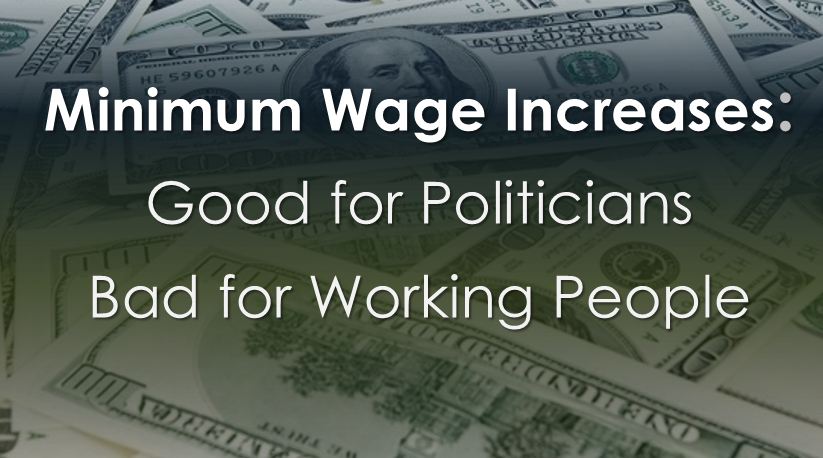The Minimum Wage Increase Shows Our Congress Does Not Understand Fundamental Economics
21 states raised the minimum wage on January 1st. Many are celebrating this a civil rights victory and a great step towards fixing inequality. They are wrong; it is a sad day for US workers.
The increase has the right intention: everyone would like to see hard working people make more money. I do not know how families get by on minimum wage and I surely hope every hard working American had more means to cover their basic needs, education and to enjoy life.
The problem is that this is not how a capitalist economy works. Economic prosperity does not come as a result of legislation. In a market economy, artificial adjustments can harm the economy and result counter-productive.
Our legislators are either incompetent in economic matters or demagoguing with populist intentions (votes over prosperity).
See, history shows us that increases in minimum wage have triggered inflation and unemployment and have never increased quality of life. Inflation nullifies any real increase in wages. We have plenty of examples in Argentina, Mexico and other countries.
Luis Pazos, Latin America’s leading economist, has been studying this matter for decades. He argues, if you could legislate prosperity, there would not be any poverty in the world. Like Jesus with the multiplication of bread, governments would increase minimum wages to the point everyone becomes wealthy.
The reality is that a higher minimum wage is likely to negatively impact the economy in four ways:
- Higher wages makes offshoring and nearshoring more attractive. The minimum wages in India and Mexico are $0.28 and $0.58, respectively. No wonder almost everything we buy today is made in China. Higher wages in US are only making it more difficult to manufacturers who are trying hard to keep their factories in the US. The problem is getting worse: You can hire a competent marketing manager or a software developer for under $5,000 per year in India.
- Higher costs for businesses inevitably will result in higher prices. Higher prices will result in general inflation, which nullify the real impact of a higher wage. Anyone who has lived in an economy with high inflation (as I did growing up in Mexico in the 80s) knows how hard this is for the general population. It’s not that business owners are bad people or greedy (some are, surely), it’s that they need to make a profit to keep the business running.
- Companies who do not have the option to move jobs offshore will have to fire people or close their doors, resulting in more jobs lost. I am not being dramatic. Talk with a few small business owners and you will learn this is the economic reality. According to Forbes, over half of the working population work in small businesses and only half remain open after 5 years. When a business closes, the impact to the economy goes beyond lost jobs.
- The US government employs 22 million people. Higher wages for a large percentage of these employees will result in higher government expense, which you and I (and every worker too) will pay in the form of higher taxes.
The only real way to increase real salaries is to increase worker productivity via technology and skills training, and to increase the overall health of the economy by fostering an economic environment that promotes the creation of new businesses and new jobs. Higher minimum wages have the exact opposite effect.
The economic growth of the United States and the increase in quality of life worldwide are not the result of laws mandating higher pay for workers, but the result of entrepreneurship (more businesses that employ people), increases in productivity, and more jobs that produce more economic value (and require higher skills). Legislators should focus on promoting laws that promote investments that result in higher-skilled jobs and in training workers to be able to do higher-productivity jobs.
Luis Pazos wrote: “Any politician, government agency or candidate that promotes an increase in wages by law ignores how the laws and mechanics of the economy works and those who listen to them are ignorant. The fairy tale of minimum wages serves to win votes, not to improve quality of life of workers”
All of us would like to see improved quality of life. I am not advocating for exploitation or greed for business owners, that’s absolutely wrong. For 20 years, I have been a proponent of socially responsible capitalism. I despise companies that do not provide health insurance while they produce large profits and pay millions to their executives.
The key point is that legislation is not the way to go. The history of minimum wage increases in countries with inflation shows us it has failed to increase equality and quality of life. In the European Union, the countries that do not have a minimum wage (including Sweden and Denmark) have 30% lower unemployment and a higher quality of life than the ones that do have a minimum wage.

